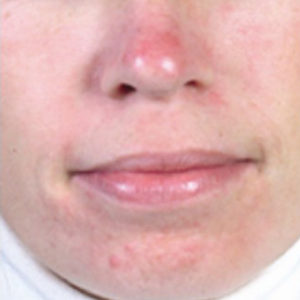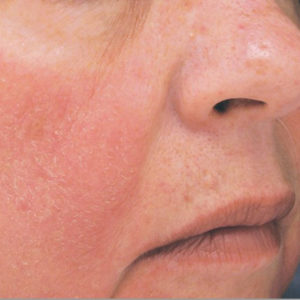Sensitized Skin
Sensitized skin is a heightened intolerance to topical products or a result of your environment.
Jump to
Continued definition
Many people experience a higher level of sensitivity to topical ingredients due to pollution in the air, poor diet, alcohol consumption or improper or overuse of certain topical products. Harsh products like alcohol-based toners can dehydrate and irritate skin resulting in a sunburn-like sensation: redness and skin that is sensitive to the touch. Most often the skin becomes sensitized as a result of these culprits leading to impaired barrier function.
Types
& Causes
Impaired Barrier Function

Impaired Barrier Function from Environmental Stressors

Impaired Barrier Function from Inappropriate Product Use

Impaired Barrier Function from PPE
Common Causes and Characteristics
- overuse of aggressive products, and use of products with excessive perfumes and preservatives
- harsh climate
- removal of the skin’s natural moisturizing factor (NMF), the substances that are responsible for maintaining the skin’s hydration and pliability, by attracting and holding moisture; removal of the NMF will result in excessive transepidermal water loss (TEWL)
- interruption of intracellular lipids found between the dead surface cells and responsible for trapping water in the stratum corneum; this lipid bilayer provides an occlusive, impermeable barrier, and prevents the loss of water and NMF
- TEWL from inside the body through the epidermis to the surrounding atmosphere; a small amount of TEWL is critical to skin health, yet excessive TEWL may result in skin sensitivity; TEWL is increased when the epidermis is compromised and the NMF is decreased
- keratin denaturation, an alteration of the protein’s shape through some form of external stress (e.g. application of heat, acid, or alkali), may prevent the keratin from carrying out its normal cellular functions
Treatments
& Protocols
How to Treat
-
Sensitive Skin: Identifying Triggers -
Sensitive Skin: Gently Exfoliate and Increase Cell Turnover -
Sensitive Skin: Decrease Redness and Inflammation -
Sensitive Skin: Increase Hydration to Control Excessive Dryness -
Sensitive Skin: Protect from UV Exposure (SPF)
Professional Treatment Protocols
-
Hydrate: Therapeutic Oat Milk Mask for Sensitized Skin Conditions -
Brightening and Smoothing Treatment Protocol for Sensitized Skin



